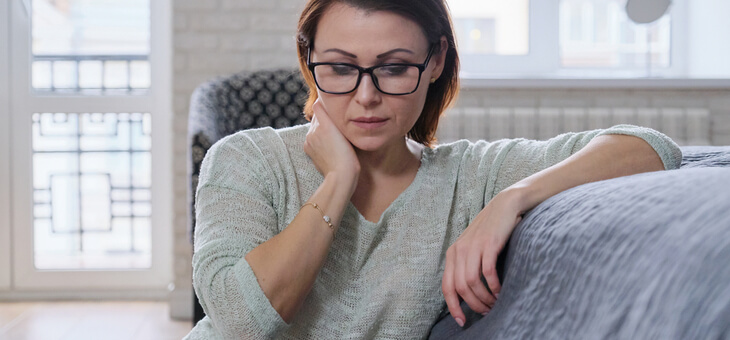Many people have been surprised by just how exhausted they’ve felt after recovering from COVID. In many cases it’s more than just feeling tired and wanting to sleep, it’s persistent, full-body fatigue.
“It’s important to recognise the difference between tiredness and fatigue, because fatigue is a marker that the body is not able to keep up,” says Dr Karin Olson, from the faculty of nursing at the University of Alberta. “The onset of the manifestations of fatigue, particularly if these are not normal states for you, should be taken seriously.”
Medically speaking, everyone gets tired. We all know that feeling after a long day or long drive of just wanting to fall into bed without so much as even washing our face. Luckily, a good night’s sleep typically solves the problem of tiredness.
Read: Those more likely to suffer from long COVID
Fatigue, on the other hand, is a daily deficiency of energy. It can present as unusual or excessive whole-body tiredness that’s not resolved by sleep, but you can’t do anything other than rest.
However, oftentimes resting with fatigue doesn’t feel good because there are typically things you need to do during the day, with fatigue though, you’re simply too tired to do them. People can experience physical, mental or emotional fatigue, or any combination of these.
Fatigue can be acute (lasting a month or less) or chronic (lasting from one to six months or longer). Fatigue can prevent a person from functioning normally and affects a person’s quality of life. Many people with autoimmune diseases feel fatigued, especially the day after a very busy day or special event.
How many people experience fatigue after COVID?
Estimates vary considerably worldwide. One review of 21 studies found 13 to 33 per cent of people were fatigued 16 to 20 weeks after their symptoms started.
So, unfortunately, fatigue is likely to continue for some time after the infection has cleared for some people. It can make you sleep more, feel unsteady on your feet, make standing for long periods difficult, as well as affect your ability to concentrate and your memory.
How to manage fatigue
Vaccines help reduce the risk of post-COVID fatigue by lowering the chance of catching COVID in the first place. Vaccinated people who do catch COVID are less likely to report fatigue and are less likely to develop long COVID.Vaccination is not 100 per cent protective and some fully vaccinated people will go on to develop longer-term fatigue.
Evidence on how to recover from post-COVID fatigue is still being collected. However, a few things can help.
Rest
Often with fatigue, you need to rest both your body and your mind. This means switching off your TV and putting your phone away to fully relax. Breathing exercises and meditation are great tools to achieve good quality rest.
Sensory relaxation tools such as fragrances, blankets, and relaxing music can also help. If a strategy doesn’t work for you, try another one until you find one that does.
Pace yourself
Don’t expect to be able to return to your usual activities right away. You may have to build up your tolerance to physical and mental exertion again. Prioritise events and chores in your life that need to be completed and focus on the things you can do rather than those you can’t.
Allow yourself to sleep
If you’ve never been one to nap, you may find yourself needing one thanks to post-COVID fatigue. Don’t fight it, set an alarm if you don’t want to nap for too long but allow yourself that time to recuperate. Rather than feeling guilty about sleeping so much, remind yourself that while you sleep, your body conserves energy and heals.
Read: What to do if you’re struggling with a sleep routine
Try to move
Even if you’re feeling fatigued and heavy, get up and move around slowly and gently a few times each day. This will keep your body mobile and help with circulation.
Return to exercise gradually
Speak to your doctor before returning to any exercise, they may be able to advise a gentle routine or put you in touch with a specialist such as an occupational therapist, physiotherapist or exercise physiologist. Feeling a huge drop in your fitness post-COVID can be devastating, but don’t push it. If you force yourself to complete the same exercise routine you were doing before COVID, fatigue over the next few days or weeks could be a lot worse.
Nourish your body
Try to keep your normal eating and drinking routine and eat a range of nutritious foods. Loss of smell, taste and appetite from COVID can put you off food but try to view food as a way of fuelling your body with both energy and the micronutrients it needs to heal. Make sure you’re drinking enough fluid each day too.
Read: Interesting ways to boost your vitamin C intake
Allow time
COVID affects everyone differently, so give yourself adequate time to recover without comparing your symptoms to other people’s. The severity of the virus doesn’t always reflect how it will impact the body in the long term and you don’t have to have been hospitalised to experience fatigue. You may want to resume your usual activities quickly, but don’t rush.
If you enjoy our content, don’t keep it to yourself. Share our free eNews with your friends and encourage them to sign up.
Disclaimer: This article contains general information about health issues and is not advice. For health advice, consult your medical practitioner.

